What to prepare for in 2019: programming trends
- Transfer
Here is the translation of a user’s article under the nickname Constantin, published on hackernoon.com. Under the cat you can find out which programming languages today are worthy of being mastered.

January is a great time to analyze the past year and look into a new one.
Programmers are trying to guess what it will be: they figure out what skills it would be nice to master, which projects you can participate in. Recently on Indorse there was a conversation about the expected trends. In this discussion curious thoughts were born, which I would like to share.
Below are the languages that have become trend in the past year, as well as new trends that will help you stay on the crest of the wave in 2019.
Stack Overflow and GitHub have a lot of information about the most commonly used programming languages.
The Stack Overflow chart below shows the most popular languages in 2018. As you can see, JavaScript heads the list, and this is not surprising: it continues to be used everywhere for both frontend and backend development. Moreover, JavaScript leads the sixth year in a row.
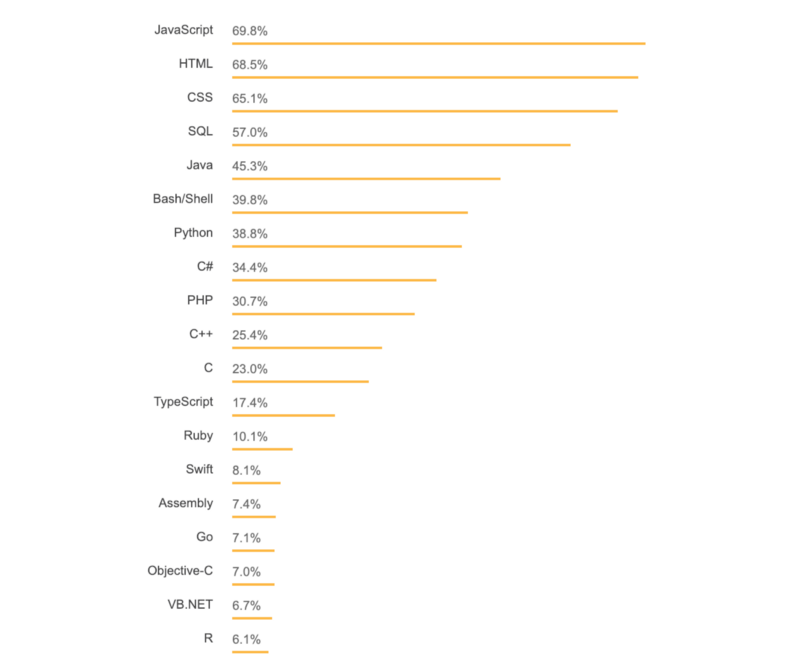
Source: Stack OverFlow
JavaScript at the height and according to GitHub (see diagram below). We see, in organizations of any scale and in any region of the world, JavaScript has the most contributors in both public and private repositories.
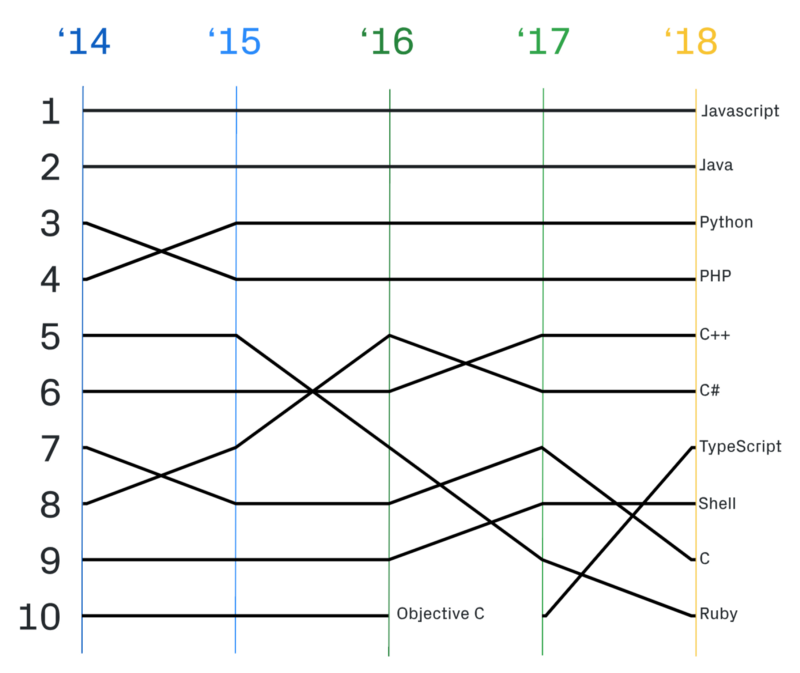
Source: GitHub Octoverse Report
By other criteria, JavaScript is also superior. In 2018, this language was the first not only in terms of the number of contributors, but also in the number of new repositories on GitHub (see the diagram below).
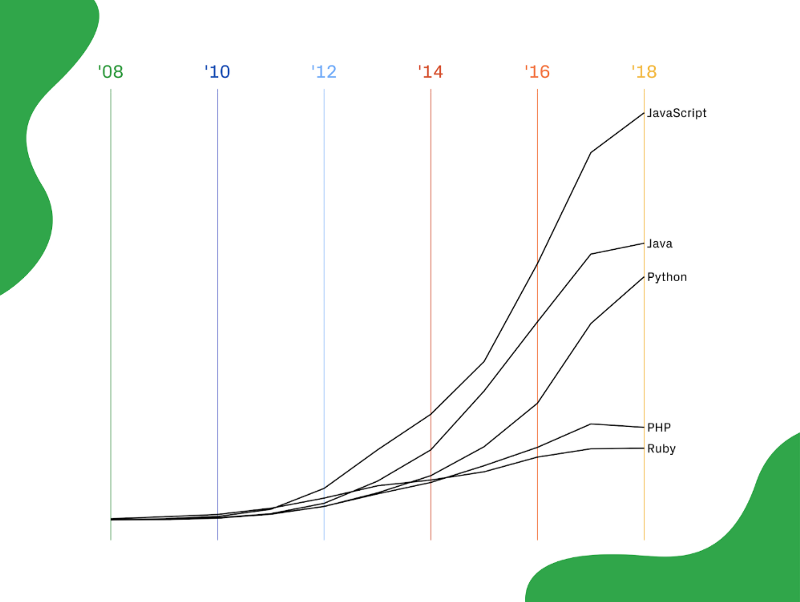
Top programming languages by the number of repositories created from 2008 to 2018 Source: GitHub Octoverse Report
This rapid take-off was due to new JavaScript servers (for example, Node.js, which was launched in 2009), which allow programmers to use the same code for both the client and the server.
And what about other languages? Python and C ++ climbed the list, C dropped slightly, and Ruby collapsed from 5th to 10th place. Another breakthrough last year made TypeScript: in the list it rose from 10 to 7 points.
How will the above described trends affect the programming area in 2019? Obviously, JavaScript will remain the predominant language. But there are other languages that are developing much faster.
If you look at the diagram above, you will see that Python is already the third most popular language in the world. But he took this position recently: according to data from Stack Overflow, Python bypassed PHP in 2017, and C # in 2018 (the dates in the selected author’s text do not match the data in the diagram below. - Ed.).
The following diagram illustrates the rapid rise of Python.
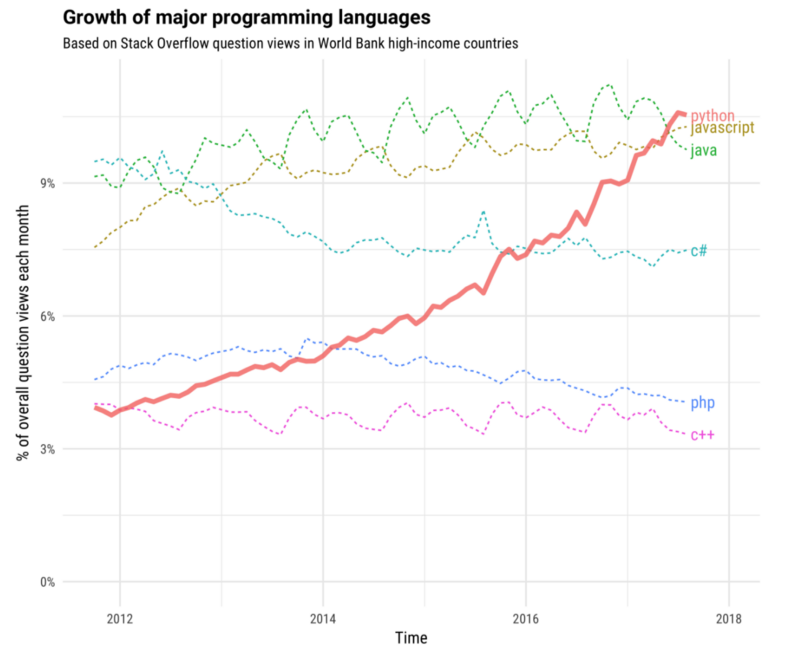
Source: Stack OverFlow
What happened?
Naturally, the growing interest in artificial intelligence (AI) contributes to the development of Python. And engineers, it seems, like to use this language for programming. According to the results of the latest survey of IEEE members, Python is their favorite.
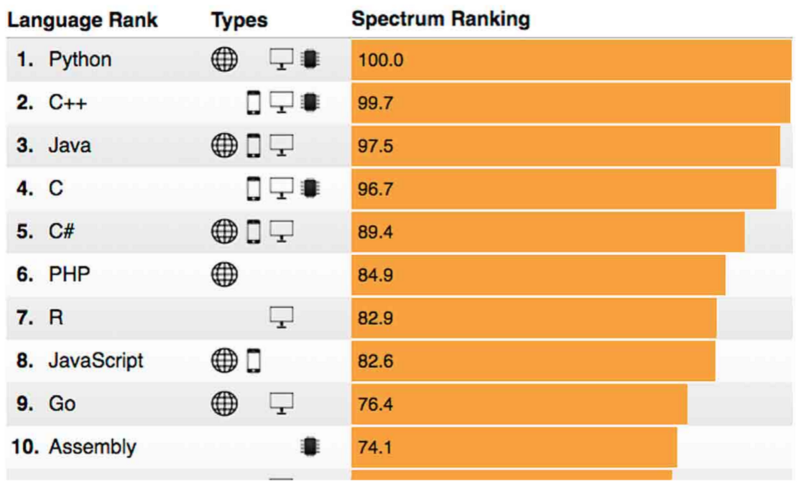
Source: IEEE Spectrum
According to the IEEE Python survey, in 2017 he took the first place - with a small margin from C. It seems that he manages to force R out in many areas (R is a specialized language for working with statistics and big data that is critical for AI and machine learning applications ).
It is likely that the availability of Python library modules for statistics and machine learning made it a more attractive language for machine learning than R. In general, with Python you can do much more than with R, which is really designed only for working with statistics and big data . For example, you can use Python to create games, websites, business applications, etc.
So, if you are thinking about working with AI and machine learning, or are already working using R, Python is a language that you definitely need to learn in the new year.
According to the latest GitHub Octoverse report , TypeScript is now in 7th place in popularity, in 2017 it was in 10th place (see the second diagram at the beginning of the article). As you can see in the picture below, at the moment it is the third fastest growing language of all.
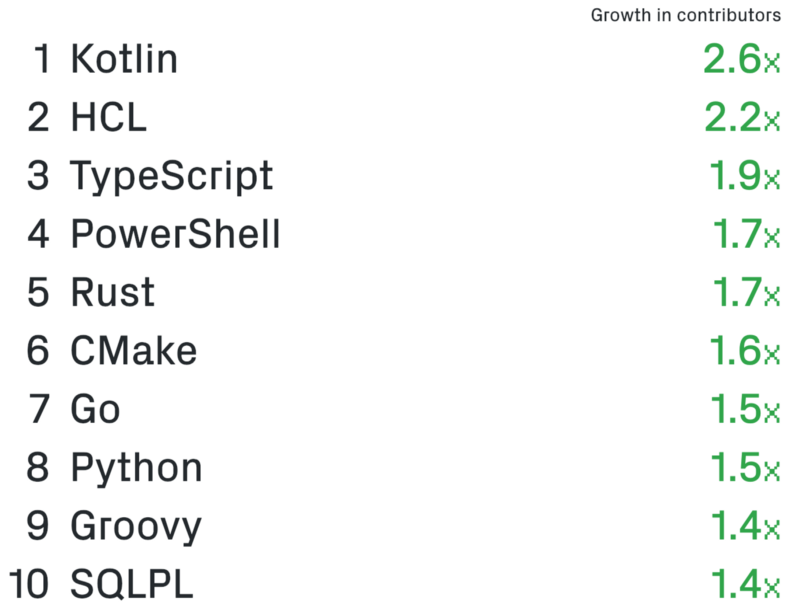
According to users, the fastest growing languages are September 30, 2018. Source: The GitHub Octoverse
TypeScript report is, in essence, a strongly typed version of JavaScript created with regard to type safety and interoperability. Strong typing means that you never have to define types for variables, because they are already defined using type inference .
What is interesting is that you can encode using TypeScript, and then compile (convert) your JavaScript code. Thus, TypeScript allows you to bypass the most annoying flaws of JavaScript.
Go in 2018 for the first time hit the top 10 according to IEEE (see above rating, published in the journal IEEE Spectrum). In addition, this is the fifth fastest growing language according to IEEE, and the seventh according to GitHub. He must be really special. Let's find out why.
Go is an open source programming language developed by Google. Similar in syntax to C, it, like Python, is simpler than other languages in terms of reading and writing. Perhaps this is the reason for the rapid growth of popularity.
In addition, Go is a strongly typed language (like TypeScript). You can use it for all types of frontend and backend applications, as well as for creating related applications that break up work into multiple threads during its execution. And, which is great, you can compile code written in Go in JavaScript.
Apparently, Google is thinking of transferring its products to work with Go, which would increase the popularity of this language even more. So choose to master Go, do not lose.

Now you know what trends in programming to pay attention in 2019. All of them - a great choice for those who want to learn something new.
Python would be a good option if you plan to do statistical analysis or machine learning on big data. You can dwell on TypeScript to more easily write codes for JavaScript. If you're used to coding with C, then Go will make your life easier by allowing you to compile the code in JavaScript if necessary.
Will new languages, such as Go and TypeScript, be able to force out JavaScript? If this happens, then many developers will be just happy, but it’s too early to make such predictions. Now we know for sure that with the Python, TypeScript and Go in the new year we will meet more often.

January is a great time to analyze the past year and look into a new one.
Programmers are trying to guess what it will be: they figure out what skills it would be nice to master, which projects you can participate in. Recently on Indorse there was a conversation about the expected trends. In this discussion curious thoughts were born, which I would like to share.
Below are the languages that have become trend in the past year, as well as new trends that will help you stay on the crest of the wave in 2019.
Take a look at the trends in programming 2018
Stack Overflow and GitHub have a lot of information about the most commonly used programming languages.
The Stack Overflow chart below shows the most popular languages in 2018. As you can see, JavaScript heads the list, and this is not surprising: it continues to be used everywhere for both frontend and backend development. Moreover, JavaScript leads the sixth year in a row.

Source: Stack OverFlow
JavaScript at the height and according to GitHub (see diagram below). We see, in organizations of any scale and in any region of the world, JavaScript has the most contributors in both public and private repositories.

Source: GitHub Octoverse Report
By other criteria, JavaScript is also superior. In 2018, this language was the first not only in terms of the number of contributors, but also in the number of new repositories on GitHub (see the diagram below).

Top programming languages by the number of repositories created from 2008 to 2018 Source: GitHub Octoverse Report
This rapid take-off was due to new JavaScript servers (for example, Node.js, which was launched in 2009), which allow programmers to use the same code for both the client and the server.
And what about other languages? Python and C ++ climbed the list, C dropped slightly, and Ruby collapsed from 5th to 10th place. Another breakthrough last year made TypeScript: in the list it rose from 10 to 7 points.
How will the above described trends affect the programming area in 2019? Obviously, JavaScript will remain the predominant language. But there are other languages that are developing much faster.
Trend 2019 # 1: Can Python catch up with Java?
If you look at the diagram above, you will see that Python is already the third most popular language in the world. But he took this position recently: according to data from Stack Overflow, Python bypassed PHP in 2017, and C # in 2018 (the dates in the selected author’s text do not match the data in the diagram below. - Ed.).
The following diagram illustrates the rapid rise of Python.

Source: Stack OverFlow
What happened?
Naturally, the growing interest in artificial intelligence (AI) contributes to the development of Python. And engineers, it seems, like to use this language for programming. According to the results of the latest survey of IEEE members, Python is their favorite.

Source: IEEE Spectrum
According to the IEEE Python survey, in 2017 he took the first place - with a small margin from C. It seems that he manages to force R out in many areas (R is a specialized language for working with statistics and big data that is critical for AI and machine learning applications ).
It is likely that the availability of Python library modules for statistics and machine learning made it a more attractive language for machine learning than R. In general, with Python you can do much more than with R, which is really designed only for working with statistics and big data . For example, you can use Python to create games, websites, business applications, etc.
So, if you are thinking about working with AI and machine learning, or are already working using R, Python is a language that you definitely need to learn in the new year.
Trend 2019 # 2: TypeScript in the top ten most popular languages
According to the latest GitHub Octoverse report , TypeScript is now in 7th place in popularity, in 2017 it was in 10th place (see the second diagram at the beginning of the article). As you can see in the picture below, at the moment it is the third fastest growing language of all.

According to users, the fastest growing languages are September 30, 2018. Source: The GitHub Octoverse
TypeScript report is, in essence, a strongly typed version of JavaScript created with regard to type safety and interoperability. Strong typing means that you never have to define types for variables, because they are already defined using type inference .
What is interesting is that you can encode using TypeScript, and then compile (convert) your JavaScript code. Thus, TypeScript allows you to bypass the most annoying flaws of JavaScript.
Trend 2019 # 3: Go simplifies programming
Go in 2018 for the first time hit the top 10 according to IEEE (see above rating, published in the journal IEEE Spectrum). In addition, this is the fifth fastest growing language according to IEEE, and the seventh according to GitHub. He must be really special. Let's find out why.
Go is an open source programming language developed by Google. Similar in syntax to C, it, like Python, is simpler than other languages in terms of reading and writing. Perhaps this is the reason for the rapid growth of popularity.
In addition, Go is a strongly typed language (like TypeScript). You can use it for all types of frontend and backend applications, as well as for creating related applications that break up work into multiple threads during its execution. And, which is great, you can compile code written in Go in JavaScript.
Apparently, Google is thinking of transferring its products to work with Go, which would increase the popularity of this language even more. So choose to master Go, do not lose.

Conclusion
Now you know what trends in programming to pay attention in 2019. All of them - a great choice for those who want to learn something new.
Python would be a good option if you plan to do statistical analysis or machine learning on big data. You can dwell on TypeScript to more easily write codes for JavaScript. If you're used to coding with C, then Go will make your life easier by allowing you to compile the code in JavaScript if necessary.
Will new languages, such as Go and TypeScript, be able to force out JavaScript? If this happens, then many developers will be just happy, but it’s too early to make such predictions. Now we know for sure that with the Python, TypeScript and Go in the new year we will meet more often.
